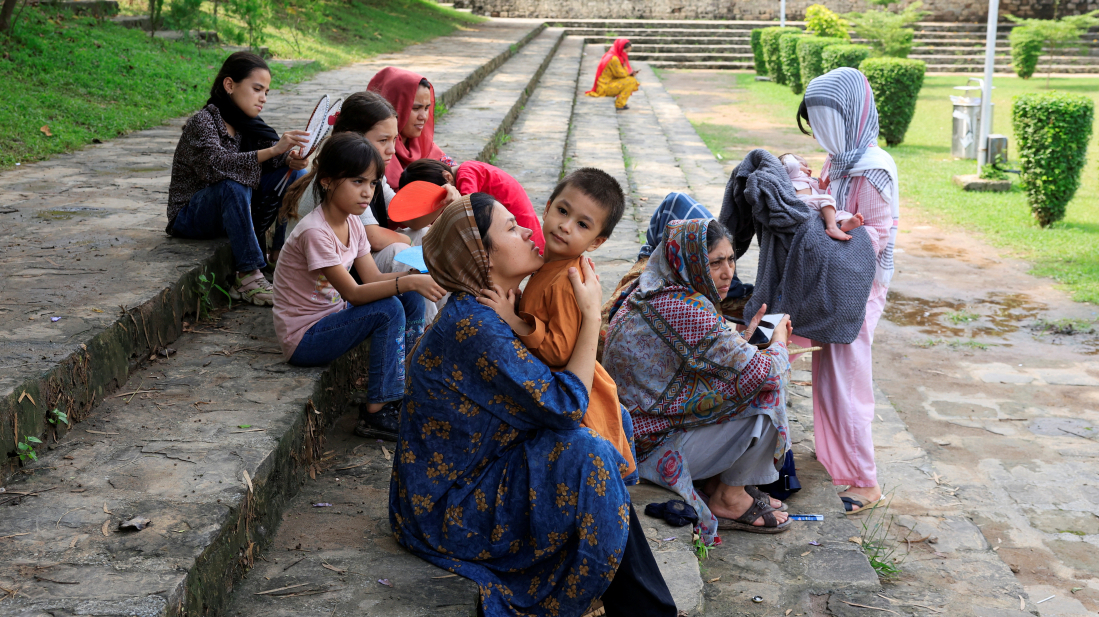Heavy rains in southeastern Brazil leave at least 30 dead
At least 30 people died and hundreds were displaced in Brazil’s Minas Gerais state on Tuesday (24 February) after relentless, record-breaking rainfa...

Hundreds of Afghan refugees, including newborns and pregnant women, are living in Islamabad park under plastic sheets with nowhere to go. It's after landlords evicted them following pressure from Pakistan to expel documented, as well as undocumented, families ahead of a 1 September deadline.
The families said they're struggling to survive amid rain, mud, and hunger. Among them is 26-year-old Samia, from Afghanistan’s Hazara minority, who gave birth three weeks ago.
“I came here when my baby was seven days old, and now it has been 22 days … we have no food, and my baby was sick but there was no doctor,” she described.
Around 200 families have taken shelter on the park’s wet ground, cooking small portions over open fires and using plastic sheets to protect themselves from the elements.
Children and parents face the daily challenge of keeping their belongings dry while battling the mud and sun. Women use a nearby mosque for basic hygiene needs.
Sahera Babur, 23, who is nine months pregnant, is among those who are affected the most.
“If my baby is born in this situation, what will happen to me and my child?” She added that police had instructed her landlord to evict her family because they were Afghan.
However, the police have denied harassing them. Deputy Inspector General Jawad Tariq said officers only asked families to leave voluntarily or relocate to holding centres.
Pakistan’s information ministry did not respond to requests for comment.
The United Nations has warned that the expulsion of Afghans could affect more than a million people. The UN High Commissioner for Refugees (UNHCR) Pakistan spokesperson, Qaiser Khan Afridi, called the situation “precarious,” noting that those unable to regularise their stay face arrest, deportation, or homelessness.
The agency is pressing the government to implement a registration system and reiterated that refugees should not be returned to life-threatening conditions.
Meanwhile, many say they cannot safely return to Afghanistan and say they have lived in limbo for years, relying on limited aid.
Former Afghan government adviser Ahmad Zia Faiz warned, “If we return to Afghanistan, there is a risk of being killed.”
Former journalist Dewa Hotak, 22, said, “UNHCR gave us promises … but they have not visited us.”
Pakistan, host to millions of Afghans since the 1979 Soviet invasion, has stepped up expulsions under a 2023 crackdown, blaming Afghans for crime and militancy, charges rejected by Kabul.
The action comes despite around 1.3 million holding refugee registration documents, while 750,000 have Afghan identity cards issued in Pakistan.
Neighbouring Iran’s plans to deport more than a million Afghans have compounded the crisis, which aid groups describe as the largest refugee return crisis since the Taliban takeover in 2021.
Despite the green grass and calm scenery of Islamabad’s park, the refugees’ lives remain precarious.
“My message to the world is to see our situation,” said Samia, clutching her newborn son, summing up the plight of her community.
Further Iran-U.S. nuclear talks are scheduled in Geneva on Thursday (26 February) as diplomacy resumes over Tehran’s nuclear programme following earlier mediation efforts. But will the talks move Iran-U.S. negotiations closer to a deal, and what should be expected from the meeting?
A British national was among at least 19 people killed when a passenger bus plunged off a mountain highway into the Trishuli river in Nepal before dawn on Monday (23 February), authorities said. A New Zealander and a Chinese national were among those injured.
Iran has signed a secret €500 million arms deal with Russia to rebuild air defences, weakened during last year’s war with Israel, the Financial Times has reported. The agreement, signed in December in Moscow, will see Russia deliver 500 Verba launch units and 2,500 9M336 missiles over three years.
Seven people were killed after gunmen ambushed a police patrol in Kohat, a district in Pakistan’s north-west near the Afghan border, on Tuesday, in an attack that comes amid rising militant violence and heightened tensions between Pakistan and Afghanistan.
Four years after Russia launched its full-scale invasion of Ukraine on 24 February 2022, the war is no longer defined by shock but by scale.
German Chancellor Friedrich Merz is heading to Beijing on for his first official visit as chancellor, aiming to strengthen political and economic dialogue with China before tackling pressing international crises.
Ukrainian President Volodymyr Zelenskyy has suggested that Hungarian Prime Minister Viktor Orbán should block financial support to Russia rather than Ukraine, as Budapest opposes the European Union’s 20th sanctions package against Moscow.
The Secretary-General of the United Nations, António Guterres, has called for an immediate, full and unconditional ceasefire in Ukraine, describing the conflict as “a stain on our collective conscience”.
Newcastle United secured a 3–2 victory over Qarabağ FK in the return leg of the UEFA Champions League play-offs at St James’ Park.
Laurence des Cars, director of the Louvre Museum, has resigned months after a $102 million daylight heist at the museum, which prompted a parliamentary inquiry.
You can download the AnewZ application from Play Store and the App Store.

What is your opinion on this topic?
Leave the first comment